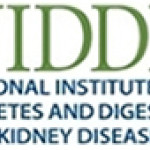- 업종: Government; Health care
- Number of terms: 17329
- Number of blossaries: 0
- Company Profile:
The National Institute of Diabetes and Digestive and Kidney Diseases (NIDDK) conducts and supports research on many of the most serious diseases affecting public health. The Institute supports much of the clinical research on the diseases of internal medicine and related subspecialty fields, as ...
A waste product in the blood that comes from the breakdown of protein. The kidneys filter blood to remove urea. As kidney function decreases, the BUN level increases.
Industry:Health care
A test of the structure, blood flow, and function of the kidneys. The doctor injects a mildly radioactive solution into a patient’s arm vein and uses x rays to monitor its progress through the kidneys.
Industry:Health care
A person who has studied diet and nutrition at a college program approved by the American Dietetic Association, completed 900 hours of supervised practical experience accredited by the Commission on the Accreditation for Dietetics Education, and passed an exam to become an R. D.
Industry:Fitness
A major source of energy in the diet. There are two kinds of carbohydrates -- simple carbohydrates and complex carbohydrates: simple carbohydrates are sugars and complex carbohydrates include both starches and fiber. Carbohydrates have 4 calories per gram. They are found naturally in foods such as breads, pasta, cereals, fruits, vegetables, and milk and dairy products. Foods such as sugary cereals, soft drinks, fruit drinks, fruit punch, lemonade, cakes, cookies, pies, ice cream, and candy are very high in sugars.
Industry:Fitness
Previously known as “insulin-dependent diabetes mellitus,” or “juvenile diabetes. ” Type 1 diabetes is a life-long condition in which the pancreas stops making insulin. Without insulin, the body is not able to use glucose (blood sugar) for energy. To treat the disease, a person must inject insulin, follow a specific eating plan, exercise daily, and test blood sugar several times a day. Type 1 diabetes usually, but not always, begins before the age of 30.
Industry:Fitness
The amount of energy, measured in calories, that a person uses. Calories are used by people to breathe, circulate blood, digest food, maintain posture, and be physically active.
Industry:Fitness
A condition present when blood flows through the blood vessels with a force greater than normal. Also called high blood pressure. Hypertension can strain the heart, damage blood vessels, and increase the risk of kidney problems, heart attack, stroke, and death.
Industry:Health care
Loose connective tissue or fat issue in the body that's
composed of adipocytes. Its main role is to store energy in the form of fat, although it also cushions and insulates the body. Obesity is usually not dependent on the amount of body weight, but on the amount of body fat - specifically adipose tissue.
Industry:Fitness
მდგომარეობა, რომელსაც ვხვდებით, როდესაც სისხხლი მიედინება სისხლძარღვებში ნორმალურზე უფრო მეტი ძალით. ასევე ეწოდება სისხლის მაღალი წნევა. ჰიპერტენზიამ შეიძლება გამოიწვიოს გულის გაფართოება, დააზიანოს სისხლძარღვები და გაზარდოს რისკი თირკმლების მხრივ პრობლემებისა, გულის შეტევისა, დამბლისა და სიკვდილის.
Industry:Health care
საშარდე გზების რენგენი. კონტრასტული ნივთიერება შეჰყავთ პაციენტის მკლავის ვენაში, რათა ხილული გახადონ თირკმელები, შარდსაწვეთები და შარდის ბუშტი და რათა გამოჩნდეს რენტგენზე საშარდე გზების ბლოკადა.
Industry:Health care
